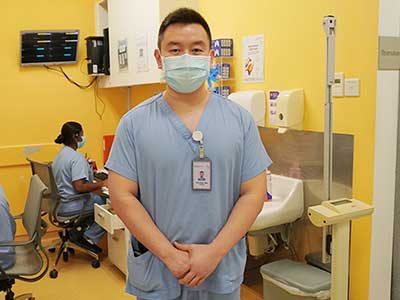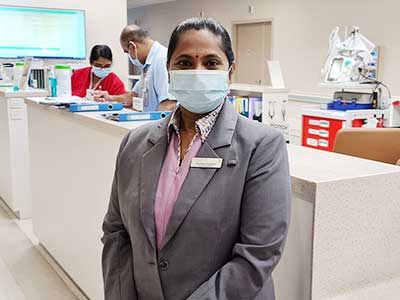.2022-07-25-10-36-38.jpg)
They say that nursing is a career of compassion, and no one embodies this better than Sarah Sharmala, Nurse Educator and a certified oncology nurse.
Though cancer treatments have advanced significantly to improve patients’ chances of survival and their quality of life, it remains a critical disease associated with complications and mortality. Because of the nature of these diagnoses, being an oncology nurse requires a strong capacity for compassion and an ability to function at a high level in emotionally stressful settings.
Sarah knows first-hand how emotionally taxing being an oncology nurse can be. Apart from understanding her patients’ needs and being tactful in her speech, oncology nurses also have to deal with the possible trauma of witnessing healthy patients deteriorate either from poor reactions to chemotherapy or progression of the disease itself.
Despite the numerous challenges, Sarah continues to extend compassion and understanding towards even the most difficult of patients.
“Cancer patients know that their immune systems may be low at times and that infection can be a matter of life or death. That’s why they can be fussy about the way nurses disinfect their intravenous lines — noticing details such as the technique of disinfecting the intravenous line with alcohol swab prior to each use,” she said.
Sarah recalled how one patient wanted her wounds to be dressed in a specific way that was familiar to her. Though Sarah initially struggled to accommodate the unique request — taking as long as 3 hours what would routinely take 15 minutes, she eventually won the patient’s trust by showing how a different dressing procedure could be just as good, so much so that the patient would request for Sarah in subsequent dressing changes.
Because of their constant one-on-one time with their patients, most oncology nurses tend to form strong and lasting relationships with the people under their care, as well as their families. Beyond addressing the illness, these relationships are crucial in helping nurses create comprehensive and personalized treatment plans for their patients.
In describing the procedure for chemotherapy patients undergoing their first cycle, Sarah emphasized the importance of being meticulous and considerate when briefing the patients, “Before I start the chemotherapy, I usually check how many chemo cycles they have completed. If it is their first cycle, it is likely that they may have little knowledge about the drugs that they're going to receive. I would take time to explain the process starting from the point of administration, the duration of the therapy, the pre-chemo medications, and what they should do if they experience any side effects or adverse reactions.”
At times, patients come unaccompanied by caregivers, “If the patient comes alone for chemo, I check in on them more frequently, bringing them to the toilet safely and making sure that they are comfortable. I stay with them for as long as needed. We’ve chatted about families, children and they sometimes open up about their life before cancer.”
While Sarah stresses the importance of professional boundaries, she admits that the emotional nature of her job occasionally gets the best of her, “I have to realize that whatever I do falls within professional boundaries. But to be very honest, at times it affected me when my patients passed on because we simply grew close. It may have been 10 to 12 years ago, but I still remember their names and my last interaction with them.”
Funnily enough, nursing was never among Sarah’s top career choices. She much prefers teaching instead. But being just one to two years younger than her brothers and coming from a middle income family, Sarah’s parents could not afford to send all three of their children to university at the same time.
Sarah thus heeded her mother’s advice to postpone her plans to teach and pursue nursing to support the family. After going through several sponsorship interviews, Sarah decided to be sponsored by a Singapore hospital and started her practice in 2009. She also obtained an Advanced Diploma in Oncology Nursing from Nanyang Polytechnic. She is currently doing research on compassion fatigue among nurses for her Master’s in Medical Science. To this day, Sarah still keeps teaching close to her heart. She took a gap year for an education and teaching certificate in Malaysia and has even had opportunities to marry her profession with her passion by conducting lectures on nursing subjects.
Day to day, Sarah prepares and conducts courses on chemotherapy administration, moderate sedation, as well as the accessing and de-accessing of the port-a-cath. She is also a chief instructor of the Basic Cardiac Life Support and Automated External Defibrillator course.
Within the clinical walls of the wards, Sarah plays a role similar to that of a guardian angel, ever ready to step in to assist whenever nurses are unfamiliar with oncological procedures, at times going beyond moral support to counsel younger nurses who struggle to manage their emotions on the job.
Though she is surrounded by the flurry of the hospital’s fast paced environment daily, Sarah never forgets to prioritize her family, returning back to Malaysia most of the weekends to visit her parents. Nevertheless, she remains committed to the hospital’s mission.
She recalls a time when family members and even strangers urged her to give up the ‘unglamorous’ life of nursing. “I simply said that I’m happy doing what I’m doing.”

I Like Being an Emergency Nurse: Here's Why
Armed with an intrinsic passion to serve and a fond memory of his nursing aunt whom he describes as “excellent clinician with outstanding leadership and administrative abilities”, Assistant Nurse Clinician Nicholas Zhu entered emergency nursing for a career.
Read his story

Passion for Nursing Burns Bright Even After Nearly 20 Years
A stalwart with over two decades of experience in handling oncological, surgical, and medical patients, Karthiga Vinayagam exemplifies how one’s passion for nursing does not have to diminish with time.
Read her story